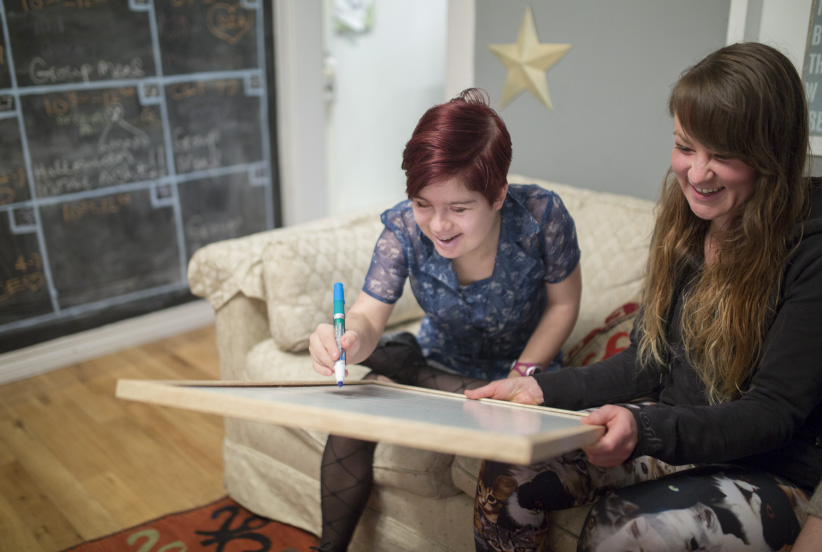Centennial students live rent-free with intellectually delayed adults
Bringing together intellectually disabled people who need good roommates and students who need cheap rent
Chore chart: Learn to respect boundaries and don’t spend too long in the bathroom
Share

Julian Lelli moved out of his parents’ house last February and into a cozy Toronto bungalow with two roommates. But this wasn’t your average collegiate living situation. Lelli, 24, and a classmate—who are both in Centennial College’s two-year developmental service worker program—live with David Grant, an autistic 30-year-old who is unable to live on his own. The students don’t pay rent, and in return have agreed to spend weeknights at home with Grant. They aren’t expected to provide personal care, but rather company, encouragement and friendship.
As part of the Friendly Housemates program—a collaboration between Centennial and Toronto Community Living—students are placed in homes with adults with intellectual disabilities for a minimum of one academic year, and the families of the latter pay for the cost of accommodation. Beyond the financial aspect, Lelli benefits from the hands-on experience in his chosen field and the relationship he’s developing with Grant.
And Grant is happy to have a roommate who likes to watch gory movies, who will fire up the BBQ for a hamburger—and who understands his challenges. “These are people who want to work with adults like David for the rest of their lives,” says Grant’s mom, Janice. “Yet they’re not there to supervise; they can be relaxed, happy and do day-to-day roommate things. It’s the perfect arrangement.”
READ: Centennial College of Applied Arts and Technology | Toronto, Ont. | Founded 1966
Friendly Housemates started as a pilot project in 2014, with students from Centennial’s health and human services programs. Now, it’s a research initiative funded by the Social Sciences and Humanities Research Council of Canada, open to all students at the college. There are currently two “family clusters” in the east end of Toronto—one in a bungalow, one in a semi-detached—but the aim is 10.
“I think about how far we’ve come in so many other areas,” says Centennial associate vice-president Marilyn Herie, the project coordinator, “yet there’s still so much stigma around people with intellectual disabilities. So we’re looking at how do we create that normative expectation? Why wouldn’t these two roommates live together, prepare meals, be out and visible in the community?”
The research has borne some surprises. Challenges are broadly the same as in any roommate situation, from respecting boundaries to spending too long in the bathroom. “And that had to be navigated by both [parties],” says Herie, noting that it wasn’t just the students complaining. “It was reciprocal. It should not have been surprising. But it challenges our own biases that it was so reciprocal.” For the students, the greater adjustment was feeling comfortable with the support workers who come in and out of the house, and in dealing with the families. “It’s almost like an in-law relationship,” says Herie.
Grant’s mom, Janice, finds the students easy to communicate with and says they never complain to her about Grant—making this easily the best situation they’ve experienced. Before Friendly Housemates, Grant lived with roommates Janice had found, and who had no vested interest in encouraging her son’s social integration. “Back then,” says Janice, “David wanted to be at our house all the time. He was quite anxious and used to call us a lot during the week saying he was lonely or mad. Since the students moved in, he’s a lot more relaxed and even refers to it as his home—says things like, ‘When am I coming to your house?’ That was a huge change for him—and us.”
Lelli sees changes too. Lately, the students have gotten Grant cleaning, doing laundry, cooking, watching movies and going out for pizza. “He doesn’t do much on his own,” says Lelli. “He needs that bond with people—he responds better when there’s an emotional connection.”
To better communicate with Grant, Lelli uses some of the techniques he’s been taught in class. He says that any squabbles have been trivial roommate stuff: “Sure, David’s drunk my juice, but when I point it out, he says sorry.” Lelli likes to look at the bigger picture. “Over time, we’ve become friends,” he says. “He knows when I’m happy, he knows when I’m mad. He can read me like a book.”
[widgets_on_pages id=”Education”]